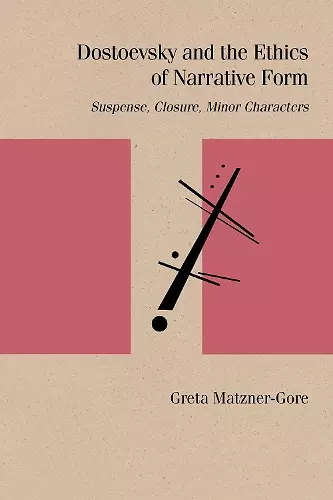Dostoevsky and the Ethics of Narrative Form
Suspense, Closure, Minor Characters
Format:Hardback
Publisher:Northwestern University Press
Published:30th Jun '20
Currently unavailable, and unfortunately no date known when it will be back

Three questions of novelistic form preoccupied Fyodor Dostoevsky throughout his career: how to build suspense, how to end a narrative effectively, and how to distribute attention among major and minor characters. For Dostoevsky, these were much more than practical questions about novelistic craft; they were ethical questions as well.
Dostoevsky and the Ethics of Narrative Form traces Dostoevsky's indefatigable investigations into the ethical implications of his own formal choices. Drawing on his drafts, notebooks, and writings on aesthetics, Greta Matzner-Gore argues that he wove the moral and formal questions that obsessed him into the fabric of his last three novels: Demons, The Adolescent, and The Brothers Karamazov. In so doing, Dostoevsky anticipated some of the most pressing debates taking place in the study of narrative ethics today. Can reading novels make us more compassionate and sensitive to emotional nuance? Or is the act of reading, instead, a variety of voyeurism? By placing Dostoevsky in dialogue with thinkers such as Wayne Booth, Suzanne Keen, and Alex Woloch and providing a fresh assessment of Mikhail Bakhtin's Problems of Dostoevsky's Poetics, this book makes an important contribution not only to Dostoevsky studies but also to the field of narrative ethics.
Well written and well structured, Dostoevsky and the Ethics of Narrative Form draws from recent strains in the fields of narrative ethics and Dostoevsky scholarship yet also strikes out on its own, providing fresh readings of familiar texts, often from unexpected angles." - Kate Holland, author of The Novel in the Age of Disintegration: Dostoevsky and the Problem of Genre in the 1870s
"Dostoevsky and the Ethics of Narrative Form addresses some of the most important questions we face today: Why read literature? Why read Dostoevsky, or, in other words, why read novels from a far away time and place? Matzner-Gore not only poses these questions cogently, she also arrives at persuasive answers." - Susan McReynolds, author of Redemption and the Merchant God: Dostoevsky's Economy of Salvation and Antisemitism
"In this lively and engaging book, Greta Matzner-Gore advances an insightful and compelling interpretation of the formal problems of Dostoevsky's final three novels. Focusing on the theme curiosity and voyeurism, the question of endings and openness, and the problems of marginalization, her masterful analysis of narrative dysfunction and distortion sheds exciting new light on the ethics of Dostoevsky's texts, and their readers." - Sarah J. Young, author of Dostoevsky's 'The Idiot' and the Ethical Foundations of Narrative: Reading, Narrating, Scripting
ISBN: 9780810141988
Dimensions: unknown
Weight: 633g
160 pages